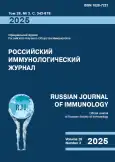Expression of innate immunity receptors under the in vivo influence of vaccine Varicella Zoster virus strains
- 作者: Zotova A.V.1, Nagieva F.G.1, Barkova E.P.1, Kraskevich D.A.1, Svitich O.A.1,2
-
隶属关系:
- I. Mechnikov Research Institute of Vaccines and Sera
- I. Sechenov First Moscow State Medical University (Sechenov University)
- 期: 卷 28, 编号 3 (2025)
- 页面: 719-725
- 栏目: SHORT COMMUNICATIONS
- URL: https://journal-vniispk.ru/1028-7221/article/view/319924
- DOI: https://doi.org/10.46235/1028-7221-17107-EOI
- ID: 319924
如何引用文章
全文:
详细
Vaccine prevention of disorders caused by the Varicella Zoster virus (VZV) is a priority of the World Health Organization’s program for eradication of socially significant and demographically important infections, being integrated into the Russian Federal healthcare program, by including VZV vaccination in the National schedule of vaccine prophylaxis. A mathematical model based on epidemiological data predicts that the vaccination coverage should be at least 60%, in order to ensure a significantly reduced incidence of chickenpox. The incidence of Herpes Zoster is also likely to decrease at later terms, while maintaining an adequate coverage level. Successful implementation of live vaccines to prevent the VZV-associated high-risk disorders is proceeds with expanding number of vaccines registered in the countries that have included vaccination in their National immunization programs. Development of a domestic vaccine is a pre-requisite for the import-replacing programs. The Mechnikov Research Institute of Vaccines and Sera has isolated and characterized wild strains of VZV that may be used to develop vaccines. Standard methods for studying the effectiveness of live VZV vaccines include assessment of adaptive immunity parameterd based on such indices as total level of antibodies to varicella zoster (GMI), geometric mean antibody titers (GMT) at certain time intervals, geometric mean multiple increase (GMFI) of antibodies to VZV over the same time period, and the level of seropositivity (defined as the percentage of subjects with an antibody titer > 1:8). However, the assessment of VZV effects on innate immunity is not studied routinely, being applied only for research purposes. To evaluate the innate immune response as an index of vaccination efficiency, one may use expression of Toll-like receptor (TLR) genes in response to vaccine administration. TLR genes encode immune receptors that recognize the structural components of RNA and DNA-containing viruses, including VZV. In turn, the TLR2, TLR4, and TLR9 expression levels are the markers of innate immunity activation, which is highly important when assessing post-vaccinal immune response. In the course of this study, the VZV strains obtained at the I.I. Mechnikov Research Institute of Vaccines and Sera were evaluated for their ability to induce innate immune response tested by the TLR2, TLR4 and TLR9 markers. The results obtained have enabled us to specify an optimal experimental sample for further studies aimed at obtaining an effective vaccine against VZV-associated infectious conditions.
作者简介
Anna Zotova
I. Mechnikov Research Institute of Vaccines and Sera
编辑信件的主要联系方式.
Email: zotova@instmech.ru
PhD (Pharmacy), Senior Researcher, Laboratory of Molecular Immunology
俄罗斯联邦, MoscowF. Nagieva
I. Mechnikov Research Institute of Vaccines and Sera
Email: zotova@instmech.ru
PhD, MD (Medicine), Head, Laboratory of Hybrid Cell Cultures
俄罗斯联邦, MoscowE. Barkova
I. Mechnikov Research Institute of Vaccines and Sera
Email: zotova@instmech.ru
PhD (Biology), Leading Researcher, Laboratory of Hybrid Cell Cultures
俄罗斯联邦, MoscowD. Kraskevich
I. Mechnikov Research Institute of Vaccines and Sera
Email: zotova@instmech.ru
Researcher, Laboratory of Molecular Immunology
俄罗斯联邦, MoscowO. Svitich
I. Mechnikov Research Institute of Vaccines and Sera; I. Sechenov First Moscow State Medical University (Sechenov University)
Email: zotova@instmech.ru
PhD, MD (Medicine), Professor, Full Member, Russian Academy of Sciences, Professor, Russian Academy of Sciences, Director; Professor, A. Vorobyov Department of Microbiology, Virology and Immunology
俄罗斯联邦, Moscow; Moscow参考
- Лавров В.Ф., Свитич О.А., Казанова А.С., Кинкулькина А.Р., Зверев В.В. Varicella Zoster-вирусная инфекция: иммунитет, диагностика и моделирование in vivo // Журнал микробиологии, эпидемиологии и иммунобиологии, 2019. Т. 96, № 4. C. 82-89. [Lavrov V.F., Svitich O.A., Kazanova A.S., Kinkulkina A.R., Zverev V.V. Varicella Zoster virus infection: immunity, diagnosis and in vivo modeling. Zhurnal mikrobiologii, epidemiologii i immunobiologii = Journal of Microbiology, Epidemiology and Immunobiology, 2019, Vol. 96, no. 4, pp. 82-89. (In Russ.)]
- Свитич О.А., Лавров В.Ф., Кинкулькина А.Р., Филина А.Б., Нагиева Ф.Г., Сидоров А.В., Алаторцева Г.И., Кукина П.И., Скандарян А.А., Зверев В.В. Разработка систем тестирования экспрессионных профилей генов врожденного иммунитета, позволяющих проводить оценку иммунологической эффективности вакцин против VZV-инфекции // Санитарный врач, 2017. № 12. С. 17-22. [Svitich O.A., Lavrov V.F., Kinkulkin A.R., Filina A.B., Nagieva F.G., Sidorov A.V., Alatortseva G.I., Kukina P.I., Iskandaryan A.A., Zverev V.V. Development of systems for testing the expression profiles of innate immunity genes, allowing for the assessment of the immunological efficacy of vaccines against VZV infection. Sanitarnyy vrach = Sanitary Doctor, 2017, no. 12, pp. 17-22. (In Russ.)]
- Arvin A.M., Moffat J.F., Abendroth A., Oliver S.L. Varicella-zoster Virus. Genetics, Pathogenesis and Immunity. Springer, 2023. 280 p.
- Lee Y.H., Choe Y.J., Lee J., Kim E., Lee J.Y., Hong K., Yoon Y., Kim Y.-K. Global varicella vaccination programs. Clin. Exp. Pediatr., 2022, Vol. 65, pp. 555-562.
- Moon J.Y., Seo J., Lee J., Park D. Assessment of attenuation of varicella-zoster virus vaccines based on genomic comparison. J. Med. Virol., 2023, Vol. 95, no. 3, e28590. doi: 10.1002/jmv.28590.
- Varicella and herpes zoster vaccines: WHO position paper, June 2014. Wkly Epidemiol. Rec., 2014, Vol. 89, pp. 265-288.
- Wang W., Pan D., Fu W., Ye X., Han J., Yang L., Jia J., Liu J., Zhu R., Zhang Y., Liu C., Ye J., Selariu A., Que Y., Zhao Q., Wu T., Li Y., Zhang J., Cheng T., Zhu H., Xia N. Development of a skin- and neuro-attenuated live vaccine for varicella. Nat. Commun., 2022, Vol. 13, no. 1, 824. doi: 10.1038/s41467-022-28329-1.
补充文件









